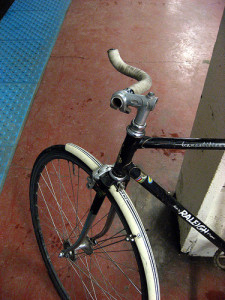
“Perfectionism is the voice of the oppressor, the enemy of the people. It will keep you cramped and insane your whole life.” – Anne Lamott
That sinking feeling you get in your stomach. The presentation, the meeting, the webinar, that you carefully prepared and planned for: it bombed. And not just a little, it really stunk up the place. (Or at least that’s what you tell yourself)
You’re embarrassed and mortified. You’d like to crawl into bed and pull the covers over your head, and forget about the rest of the day, week or month; bury your face in your favorite junk food while binge watching your current guilty Netflix pleasure and completely zone out; or disappear to the nearest desert island until it’s safe to be out in public again.
We can get so down on ourselves when we mess up.
As products of western culture and education, many of us are programmed to judge ourselves harshly when we make a mistake.
And not just a little dab will do: for many of us, the judgement we mete out on ourselves brings on a full-fledged shame attack.
All we can see is what we are doing wrong instead of the many things we are doing right.
The F Word
I’d love to redeem a word in our language – the “F” word.
No, not that one (though it has its merits as well, and my family would tell you I’m in the frequent flyer club for that one as well) but this one:
FAILURE.
How ‘failure’ stops us
The problem with labeling missteps or mistakes as failure is that it stops us: we’re less likely to take risks, and we don’t learn from what just happened.
If we frame making a mistake into all-encompassing judgement against our character, we are less likely to try something new next time.
When something doesn’t go the way we expect, if we overly criticize ourselves and let shame enter the equation, we are less likely to be able to harvest the learning that’s ripe for the picking.
If we call it failure, we dive into what appears to be the safety of the covers, old habits and avoidance.
And as you’ve probably figured out by now, procrastinating and escaping isn’t usually associated with making big and significant change in the world.
Why I want you to fail
What I know about failing is that it means is I’m trying: usually something new and something I’m not good at. Failing also means I’m doing something, instead of just thinking about doing it.
So, for the sake of what we want to create in the world, let’s embrace failure as fast learning.
Or better yet, let’s stop worrying about getting it right in the first place.
Because the truth is, especially with the work of social change, if the answers were known, if we knew exactly what we were doing at all times and could completely predict our success, it would be done already.
How to fail better
- Know yourself. What are you good at? What’s your growing edge? Know and utilize your strengths. At the same time, you have to continue to expand at least slightly beyond your comfortable range in order to grow. Behavioral scientists believe that we do best when we have stretch goals just slightly outside of our comfortable reach.
- Trust your own data. Success for you is your own definition; it doesn’t belong to anyone else. Know what constitutes success based on your own values and goals.
- Do it now: don’t wait. We need to, as the writer Anne Lamott says, write shitty first drafts. Whatever that means to you, in your context: please let go of perfection (it doesn’t exist), and just get it out there.
- Get curious. When you fail (and you will, because you are a human), be willing to put down the armaments of judgment and get curious about what happened. Bring only your most loving and curious self to examine and learn from the experience.
- Begin again. And again. And again. We aim towards a great horizon but we can only do what is in front of us today.
Your Turn
In the Comments below, it’s your turn!
What helps you recover when you make a mistake?
How could reframing failure as fast learning help you do more good in the world?
For more insight into what’s important you, including your values and vision, download my Road Map tool here!
P.S. Pass it on
Loved this post? Then use the icons below to tweet it, share on Facebook, and send to specific friends via email.
Photo credit: mindfrieze / Foter / CC BY-SA

 Before specializing as a professional coach in 2004, I spent more than a decade in leadership, management and program development for state and local government and non-profit organizations. Now I get to help leaders and teams have more clarity and ability to stand up for what's important in their work and in their organizations. Working with me, leaders and teams find more meaning and purpose, feel happier and more confident, navigate change and conflict, and work together better.
Before specializing as a professional coach in 2004, I spent more than a decade in leadership, management and program development for state and local government and non-profit organizations. Now I get to help leaders and teams have more clarity and ability to stand up for what's important in their work and in their organizations. Working with me, leaders and teams find more meaning and purpose, feel happier and more confident, navigate change and conflict, and work together better.
Hello Hanna. It’s my first time here. Thank you for sharing this insightful post. I’m particularly drawn to this part: ‘If we frame making a mistake into all-encompassing judgement against our character, we are less likely to try something new next time.’ What a powerful way to put it. Something for me to sit with there and reflect upon. Thank you.
Lisa, glad if this post provided some food for thought. I’d love to know where it takes you – stop by again!
Hi Hanna – good article and I totally agree about just starting, just get out there and have a go. As I deal with technology, if we waited for the “right” program, the “right” social media channel, the “best” website we can do – we’d never do anything! You need to plunge in and maybe doggy paddle a bit before you start really swimming well. However being a sensitive being, I would also allow recovery time, just for a while, from when it all ‘appears’ to have gone wrong. It hasn’t – gone wrong, that is, as we can see from your article – but it still hurts a bit and some gentle treatment and positive self-talk helps a lot, I find!
Thanks for adding that, Rosemarie, that we do often need a rest and some recovery time, particularly if our habit has been to be harsh with ourselves. Can never go wrong with some self-care! Thanks for your insights!
Great post, Hannah, with lots of wisdom and food for thought!
For me, the fear of being seen to make a mistake was one of the biggest blocks holding me back in life. I’m learning to see it differently – and that’s a process!
‘Failing’ is how we learn and gather information how to do something differently next time. We’ve all failed in the past and will again in the future – the trick is not to let it define who we are as beings.
Thanks for sharing your wisdom.
It is a process, isn’t it? Thanks for sharing your wisdom here too, Linda!
Love this post Hanna thank you.
It so hit a chord with me because I’m leaning in to the concept of failure as feedback – it’s the only way we can learn, by stretching out of our comfort zone. Yet if we do this armed with our usual ‘perfectionist’ mentality, it’s a really painful process.
I love the bit where you say “ Bring only your most loving and curious self to examine and learn from the experience.”
By being curious and loving, we free ourselves to be ‘human’, and to bear witness to what happened without judgement.
It’s a constant learning process, and I know for myself, requires constant attention and practice!
Thanks for the reminder! 🙂
So glad you found it helpful, Ann! Curiosity and love are the best antidotes to self-judgment in my experience – not always easy, but as you say, it does get easier with practice! I’m cheering you on!
Hi Hanna, really helpful post. I use the ‘there’s no failure only feedback’ mantra which helps to learn when things don’t go quite right, and I love your phrase to embrace failure as fast learning because that’s what it is if we keep an open mind. I’ll certainly use that now as it will encourage me to try more things and to take the time afterwards to reflect on what I can learn (positive and negative).
Yay for you, Lesley! I’d love to hear how it goes! Thanks for your comment!
LOVE “Lets embrace failure as fast learning” How true and what a brilliant reframe. Have to admit as I’ve got a little older I’ve lost much of my fear of making what I fear to be a fool of myself and have found this so liberating and it makes failure just the next step to success. Loved the post – a fantastic reminder
Dawn, “failure as next step to success” – yes! It’s so lovely to drop the worry about being a fool – or even enjoy it a bit! So grateful for your input here – thanks for stopping by!